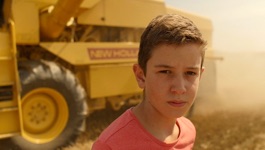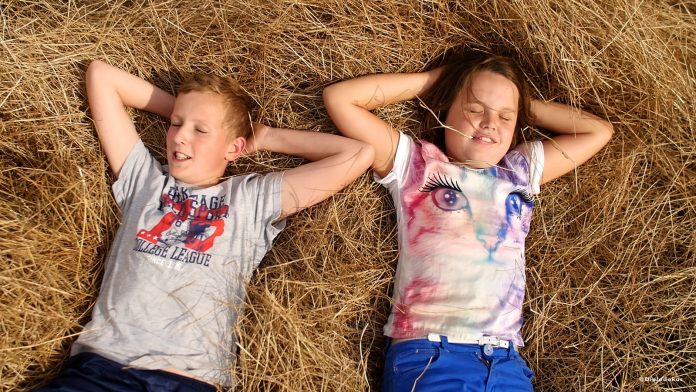(THIS ARTICLE IS MACHINE TRANSLATED by Google from Norwegian)
Pig cubs are born, their weak little bodies – sticky and tangled with placenta and umbilical cord – fill the entire canvas. Cows are milked while the boy in blue overall caresses the kurumpa, cleans the barn and rests his head gently against the back of the cow.
Another boy, in green overalls, sits on the potato recorder and carefully examines the harvested potatoes. We hear him say: “I never doubted that I would become a farmer. My grandfather took over after his father, and my father took over after grandfather. It would be nice to continue for another generation. ”One can only admire the mixture of innocence and determination the young boy expresses.
 The third, slightly older than the other two, is not as sure of its identity: “I am the only one of my friends who wants to work in agriculture. But they can't see it on me. I am perfectly normal, just like the others. ”
The third, slightly older than the other two, is not as sure of its identity: “I am the only one of my friends who wants to work in agriculture. But they can't see it on me. I am perfectly normal, just like the others. ”
When we see the girl for the first time, we notice a detail on her left foot: Each nail is painted with its own color. She studies the screen of her smartphone while telling: "I have 55 bottles of nail polish. We have 450 sheep. ”
Young farmers
The four protagonists in this documentary, the first full-length movie by Janet van den Brand, are masterfully orchestrated throughout the film; the individual represents an aspect of their particular experience. Each of them lives on a remote farm in the southwestern part of the Netherlands and learns the profession of ancestors at a young age, as stated in the promo material. But their stories are the same.
Perhaps this is what is needed to avoid the consequences of global liberal capitalism and the devastating impact it has on life on the planet.
Koen Brouwer, the boy in the light blue overall, is the most sensitive of them. He experiences the world through physical contact – with the earth, the animals on the farm, the skin of the pigs he lubricates with sunscreen so that they are not burnt. He even sticks his whole arm, wearing a long plastic glove, into the cervix of the cow that is about to calve, to feel the body of the calf to be born soon.
The boy in the green overall, Daan Rentmeester, is the resolute one. Serious, keen to carry on the tradition, competitive and therefore happy that he has a sister and not a brother who could also want to take over the farm. He is so interested in farming that even when he plays, he does so with agricultural games and computer games related to the peasant industry.
The third, Sven Boonmann, seems older because he (already) has his doubts and hides his identity as a farmer. He is aware of other children and their lack of interest in farming, and questions the world around him. He is curious, bored in the winter and dreams of traveling to distant places.
 The girl, Jeanine de Bree, follows her father and the sheep without comment. She is gentle, happy when surrounded by friends, always with the smartphone in hand. In the flower bed, she declares that one beautiful day she might work as a hairdresser or gardener. However, since much of her portrait is limited to the interest in makeup and boys, it is unclear how much of the stereotypical femininity is hers and how much is projected on her by the filmmaker.
The girl, Jeanine de Bree, follows her father and the sheep without comment. She is gentle, happy when surrounded by friends, always with the smartphone in hand. In the flower bed, she declares that one beautiful day she might work as a hairdresser or gardener. However, since much of her portrait is limited to the interest in makeup and boys, it is unclear how much of the stereotypical femininity is hers and how much is projected on her by the filmmaker.
Yet, although this portrait of the kids seems quite stereotyped from time to time, this film's real strength lies precisely in its willingness to adapt the filmed reality to the filmmakers' expectations. The children's faces are filmed very closely, creating a high degree of intimacy, even familiarity – at least the impression of knowing them very well. You can almost feel their hard life in harsh environments giving them limited time to play with peers and be children.
An experiment
This is in sharp contrast to the perfectly light and beautifully composed settings with bright colors. The grass is clear green, the sky is heavenly blue, the dawn is golden. Even the raw meat plastic bags look rude, and the tongue of the cow resembles a flower in a photo of Mapplethorpe. As the plastic tire moves vigorously in the wind, this documentary begins to recall an experimental film. The beauty of it lies in the fact that all this is largely in place. The purpose behind making farmers, their children and farm life aesthetically pleasing, is high-quality and useful, but Ceres goes further than that. It is not only a good enlightenment film, but also an experiment, an innovation, an attempt – in contrast to the stereotypical profiles of the children – to change the stereotypes and make people think differently.
In addition to providing quality information for children writing Ceres into a broader political context.
The real hero of the movie is the boy in blue overalls, who finds shelter in the pigs when people make him feel bad for fashion, declares that the pigs are his friends, but who also eat them after they are slaughtered. Gradually, his attitude takes over the whole movie and represents life and death together, as part of a single natural cycle – here one boy is shown helping to slaughter cocks, while another helps bring a calf to the world.
Political
I have to admit that I've seen things in this movie that I've never seen in my life before. It was selected for the Berlin International Film Festival, where it participated in the competition in the Generation Kplus program, which is dedicated to "outstanding films for children and young people as well as films for all audiences also suitable for young people".
 In addition to providing quality information for children writing Ceres into a broader political context. Perhaps this is what is needed to avoid the consequences of global liberal capitalism and the devastating impact it has on life on the planet, especially the food we put on the plate. Respecting those who produce food, who clean the barn and pick the potatoes from the earth, keeping them close to our homes and our hearts, seems to be the surest way to stop global companies from poisoning the planet and our health. Then it is a little embarrassing that the film openly advertises one of the largest producers of agricultural machinery through product placement, especially because children are the film's main audience.
In addition to providing quality information for children writing Ceres into a broader political context. Perhaps this is what is needed to avoid the consequences of global liberal capitalism and the devastating impact it has on life on the planet, especially the food we put on the plate. Respecting those who produce food, who clean the barn and pick the potatoes from the earth, keeping them close to our homes and our hearts, seems to be the surest way to stop global companies from poisoning the planet and our health. Then it is a little embarrassing that the film openly advertises one of the largest producers of agricultural machinery through product placement, especially because children are the film's main audience.


